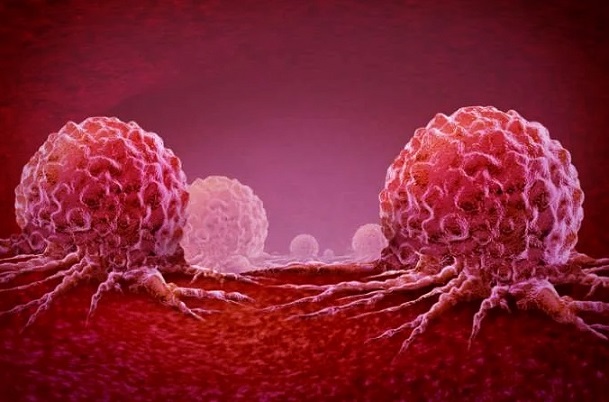Leptin Triggers Dangerous Cancer Pathway in Breast Tumors Through Hidden Blood Vessel Mimicry
Nikhil Prasad Fact checked by:Thailand Medical News Team Jun 16, 2025 8 months, 1 week, 20 hours, 58 minutes ago
Medical News: Scientists from Kyung Hee University in South Korea and the University of Texas Health Science Center at San Antonio have uncovered a hidden mechanism by which a common hormone called leptin could be fueling the spread of breast cancer. Their research, just published, reveals how leptin promotes a dangerous process known as vasculogenic mimicry (VM), where cancer cells themselves form vessel-like networks to feed tumors, bypassing normal blood vessels.
 Leptin Triggers Dangerous Cancer Pathway in Breast Tumors Through Hidden Blood Vessel Mimicry
Leptin Triggers Dangerous Cancer Pathway in Breast Tumors Through Hidden Blood Vessel Mimicry
This
Medical News report explores the discovery that leptin increases levels of a protein called metastasis-associated protein 1 (MTA1), which then helps breast cancer cells create these fake blood channels. The findings shed light on why some breast cancers become so aggressive, especially in women with obesity, where leptin levels are often elevated.
What Is Vasculogenic Mimicry and Why It Matters
Vasculogenic mimicry is a sneaky trick used by some aggressive cancers. Instead of relying on the body’s normal blood vessels, these cancers create their own vessel-like structures using tumor cells. These fake vessels still transport nutrients and oxygen to the tumor, but they’re not made from the usual endothelial cells. That means many anti-cancer drugs that target blood vessel growth don’t work on cancers using VM.
In breast cancer, this form of mimicry is a red flag. It’s associated with more invasive tumors, higher chances of spreading, and worse survival rates. Until now, scientists were still figuring out what causes VM in breast tumors.
Leptin and MTA1 Join Forces
Leptin is a hormone made by fat cells. It helps regulate hunger and metabolism. But in people with obesity, leptin levels rise—and unfortunately, that excess leptin may be bad news for cancer patients. Past studies already linked leptin to faster tumor growth. Now, this new research shows leptin also plays a direct role in helping tumors create their own blood supply.
Using human breast cancer cell lines (MDA-MB-231 and Hs 578T), the researchers showed that leptin significantly increased both the gene and protein levels of MTA1. This effect happened through the Ob-R leptin receptor and the STAT3 signaling pathway. When either the receptor or STAT3 was blocked, MTA1 levels dropped, even in the presence of leptin.
MTA1 Turns on Cancer’s Blood Channel Machinery
Next, the team overexpressed MTA1 in the cancer cells using a CRISPR activation method. As expected, this triggered a surge in VM activity. The cells began forming blood vessel-like structures in lab models. Notably, key proteins involved in VM—VE-cadherin, Twist, MMP-2, and LAMC2—were all elevated. These molecules are known for helping cells break through barriers, move around, and cling to new areas—all hallmarks of metastasis.
But when the scientists sil
enced MTA1 using siRNA, leptin could no longer trigger VM. The formation of vessel-like networks dropped dramatically. The production of the same VM-related proteins also decreased, confirming that MTA1 is essential for leptin to exert this dangerous effect.
New Targets for Breast Cancer Therapy
The implications are significant. Obese patients with breast cancer often have higher leptin levels, and this could explain why their cancers are harder to treat. MTA1, now shown to be a critical player in VM, could become a new target for therapies aimed at stopping this mimicry and starving tumors of their nutrient lifelines.
Blocking MTA1 might not only reduce the ability of cancer to grow its own fake blood vessels but could also help overcome resistance to standard anti-angiogenic drugs. In addition, disrupting the leptin-MTA1-STAT3 axis may offer new hope for more personalized treatments.
Conclusion
This study offers a major leap in understanding how leptin, a hormone associated with fat and appetite, can drive breast cancer progression by activating a hidden vascular system inside tumors. Through its effect on MTA1 and related proteins, leptin enables breast cancer cells to build their own blood vessel-like channels, fueling tumor growth and resistance to therapy. These findings point to MTA1 as a critical target for future breast cancer therapies, especially in patients struggling with obesity. By blocking this protein or its pathway, doctors may one day improve outcomes for those with aggressive forms of the disease.
The study findings were published in the peer-reviewed International Journal of Molecular Sciences
https://www.mdpi.com/1422-0067/26/12/5726
For the latest Cancer News, keep on logging to Thailand
Medical News.
Read Also:
https://www.thailandmedical.news/news/new-hope-in-the-fight-against-triple-negative-breast-cancer-as-scientists-uncover-dangerous-role-of-glucocorticoid-receptor
https://www.thailandmedical.news/news/repurposed-hiv-drug-shows-promise-in-boosting-breast-cancer-chemotherapy
https://www.thailandmedical.news/news/jacaric-acid-from-plants-found-to-kill-breast-cancer-cells-and-also-enhances-other-cancer-treatment-protocols
https://www.thailandmedical.news/news/weill-cornell-researchers-warn-that-a-common-dietary-fat-is-fueling-the-most-dangerous-type-of-breast-cancer
